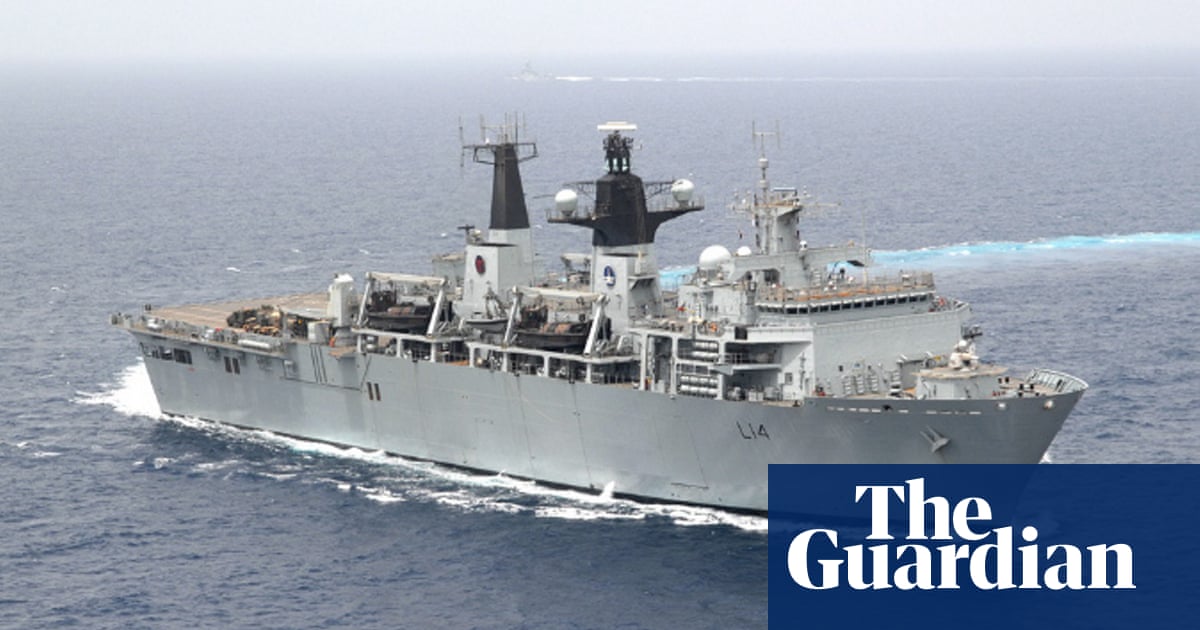The defence secretary, John Healey, has announced he will scrap British navy vessels and army drones as part of £500m in cost-saving measures in what was described as a “black day” for the new government.
Two former Royal Navy flagships, a frigate and two support tankers will be decommissioned, with the savings reinvested into the defence budget. Healey blamed the move on a “dire inheritance” left by the previous Tory administration.
The announcement was described by the shadow defence secretary, James Cartlidge, as “cuts instead of a pathway to 2.5%” and “a black day for the Royal Marines”.
The government said it would raise UK defence spending to 2.5% of GDP, but is yet to provide an end date for the initiative. As part of the measures, the assault ships HMS Albion and HMS Bulwark will be decommissioned.
Julian Lewis, the chair of the intelligence and security committee, asked the defence secretary: “Does he agree with me that we have no way of knowing whether the absence of that capability for the next decade won’t be an incentive to somebody to try something like the Falklands in the future?”
Healey responded: “On HMS Albion and HMS Bulwark, he is right. Both ships were not due to go out of service for nine and 10 years respectively, but neither, given the state they’re in, the decisions taken previously by the last government, were set to sail again. In other words, they’d, in practice, been taken out of service, but ministers had not been willing to admit this.”
Healey claimed that amphibious capability would be provided by remaining ships and the £9m a year that would be saved would be focused on the development of support ships that promised “greater capability” and “a broader range of ability for the future”.
The cuts will also have an impact on the provision of helicopters, with the 14 oldest chinook transport aircraft removed early from service and the Puma’s lifespan not being extended beyond March 2025.
Healey said: “This acceleration of their retirement will apply to the 14 oldest helicopters in the fleet of more than 50. Some of those are more than 35 years old, and it means that these oldest 14 will be retired at the point where they are due to enter a costly maintenance package – that will not happen.
“It means that we can speed up the transition to the new, much more capable chinooks that will arrive, and it also means that we can save money for defence that we can redeploy to other purposes.”
Healey informed MPs that he had spoken with his Ukrainian counterpart, Rustem Umerov, in Kyiv on Tuesday and they had discussed the UK’s plan to provide support.
He said: “We’ve seen over recent weeks significant change in the action and in the rhetoric on Ukraine, and Ukraine’s action on the battlefield speaks for itself. We as a nation and as a government are doubling down on our support for Ukraine and determined to do more. I discussed this with Minister Umerov in a call yesterday [Tuesday] where he talked about the robust response that Ukraine is making to recent Russian escalations.
“That’s the escalation in the attacks on Ukrainian cities and children, the escalation in attacks on their energy system and the escalation with deploying 10,000 North Korean troops in combat positions on the frontline.
“We discussed also our plans as the UK to support them throughout 2025. I remain committed to keeping parliament as fully informed as possible and [the shadow defence secretary] and the house I think will understand the reasons why at this point, I’m not able to go into any further operational details.”
The army fleet of 47 Watchkeeper drones is also being culled, even though they have only been in service for six years. A UK defence source said that it would allow the MoD to exploit the more modern technology used in Ukraine.

